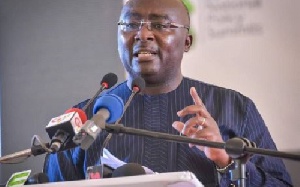 Vice President Dr. Mahamudu Bawumia
Vice President Dr. Mahamudu Bawumia
Vice President Dr Mahamudu Bawumia on Monday expressed Government’s determination to explore the use of modern technological tools to combat the canker of corruption in the country.
He said corruption was the greatest threat to human race and served as an obstacle that undermined government’s ability to fulfill its obligation to promote, protect and respect human rights.
He noted that the nation might not attain its objective of building a Ghana beyond Aid, if corruption thrived, and assured of Government’s commitment to equip all the anti-corruption institutions in the country with the requisite resources to combat corruption.
“We’re capable of funding the majority of our development needs if we can check corruption.
“This is the time to wage an unrelenting war against corruption and to end the public resource waste to sustain fiscal discipline, change our mentality and attitudes towards state and state property, and imbibe sound work ethics into our national life,” he emphasized.
Vice President Bawumia gave the assurance when he delivered the keynote address at the closing ceremony of a week-long Anti-Corruption and Transparency Conference in Accra.
The Vice President also used the occasion to launch the National Anti-Corruption Action Plan (NACAP) Online Reporting Dashboard, which was developed to assist in the implementation and reporting on the Action Plan against corruption.
The digital system would help anti-corruption institutions to compile progress report and reduce the use of paper work.
The conference, organized by the Commission on Human Rights and Administrative Justice (CHRAJ), also marked the celebration of the 70th anniversary of the Universal Declaration of Human Rights and the 15th anniversary of the United Nations Convention against Corruption.
It was held under the theme:”Waging the Fight against Corruption; Panacea for Ghana Beyond Aid?, which attracted key stakeholders in the fight against corruption, including civil society organization, anti-corruption coalitions, state agencies, development partners and the media.
Vice President Bawumia said the fight against corruption was a collective responsibility of all stakeholders and should not be left to the government alone, saying; “We must collectively fight corruption in a responsible and sustainable manner”.
“We must be able and willing to question poor behaviour, poor performance, administrative obstruction, dishonesty, maladministration, improper use of discretion in administration decision-making,”the Vice President added.
Vice President Bawumia noted that the implementation of the National Anti-Corruption Action Plan was a priority of (NACAP) because it was a home-grown solution to combat corruption, which posed a good understanding of the corruption risk across all sectors of the economy and how it must be eliminated.
He mentioned some programmes rolled out by the Government within the past 22 months to enhance delivery of public services and combat corruption, including the paperless ports system, e-registration of businesses and electronic public procurement system, while efforts was underway to implement online registration of land titles.
Mr Joseph Whital, the Commissioner of CHRAJ, in his welcoming address, said the Commission since its establishment about 25years ago, had been promoting, protecting human rights and administrative justice, as well as promoting integrity and ethical values and conduct, through coordinated implementation of NACAP.
He was optimistic that the outcome from the conference would ensure the implementation of NACAP, sustain the campaign against corruption and enhance integrity in the country.
Mr Richard Quayeson, the Deputy Commissioner of CHRAJ, presented the State of Human Rights Report of the country for the year under review and outlined some challenges facing the Commission regarding the implementation of NACAP.
He urged the government to address the low stakeholder participation in the implementation of NACAP and called on government to ensure all Ministries, Departments and Agencies implement actions in the Action Plan, the need to resource all anti-corruption institutions in order to reduce corruption and promote integrity in public offices.
Mr Antonio Gutierrez, the United Nations Secretary-General’s report to mark the 70th anniversary of the Universal Declaration of Human Rights and 15th anniversary of the United Nations Convention against Corruption was read at the meeting by Ambassador Evans Klock, the UN Resident Representative to Ghana.
The World Economic Forum estimated that the cost of corruption is at least 2.6 trillion dollars, representing five per cent of the global domestic product, while the World Bank says one trillion dollars is paid in bribes by businesses annually.